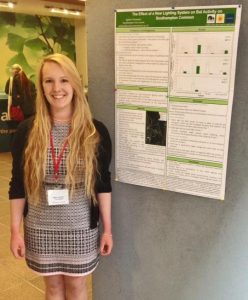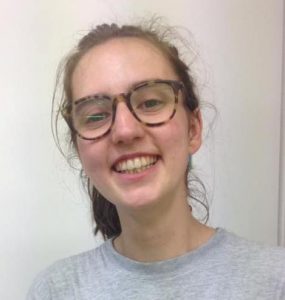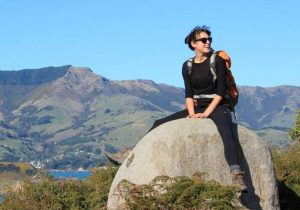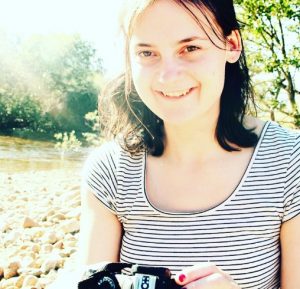Aggie Thompson, 22
Background:
 I graduated from the University of Southampton in 2015 with BSc Zoology, specialising in ecology, behaviour and conservation. During the summer of 2015, I conducted a study on the impact of new artificial lighting systems on bat activity on Southampton Common as part of an internship for Southampton City Council. I have also worked as an independent surveyor for an ecological consultancy on bat surveys, and in Calakmul, Mexico, studying spider monkey social behaviour.
I graduated from the University of Southampton in 2015 with BSc Zoology, specialising in ecology, behaviour and conservation. During the summer of 2015, I conducted a study on the impact of new artificial lighting systems on bat activity on Southampton Common as part of an internship for Southampton City Council. I have also worked as an independent surveyor for an ecological consultancy on bat surveys, and in Calakmul, Mexico, studying spider monkey social behaviour.
Research Area:
My interests lie in the conservation and behaviour of mammals and their importance as indicators of environmental quality.
Why I chose MRes Wildlife Conservation:
The course provides a unique collaboration between two institutions which together offer us a strong combination of teaching, field skills and project management techniques, as well as opening the door to a wealth of experiences both through Marwell Wildlife and the University of Southampton. For me, the chance to gain this practical research experience at the same time as receiving a masters degree should help me towards a career in wildlife conservation.
Bethan Govier, 23
Background:
 I graduated with a BSc (Hons) in Animal Behaviour and Welfare from Harper Adams University in 2015. My undergraduate research project investigated the growth rates of Telfair’s Skinks (Leiolopisma telfairii) in a captive population at Durrell Wildlife Conservation Trust, Jersey, and in head-started individuals on the island of Ile aux Aigrettes, Mauritius. Having enjoyed a yearlong student placement based within the Herpetology, Bird and Laboratory Departments at Durrell, I was given the opportunity to return as a Herpetology Keeper following my graduation. My time on the Herpetology Department further enhanced my knowledge and love for reptiles and amphibians.
I graduated with a BSc (Hons) in Animal Behaviour and Welfare from Harper Adams University in 2015. My undergraduate research project investigated the growth rates of Telfair’s Skinks (Leiolopisma telfairii) in a captive population at Durrell Wildlife Conservation Trust, Jersey, and in head-started individuals on the island of Ile aux Aigrettes, Mauritius. Having enjoyed a yearlong student placement based within the Herpetology, Bird and Laboratory Departments at Durrell, I was given the opportunity to return as a Herpetology Keeper following my graduation. My time on the Herpetology Department further enhanced my knowledge and love for reptiles and amphibians.
Research Area:
My 8-month MRes research project will be a UK based project focusing on population management of the Sand Lizard (Lacerta agilis).
Why I chose MRes Wildlife Conservation:
I chose this course because of its unique structure combining taught aspects with an in-depth research project. The collaboration between University of Southampton and Marwell Wildlife not only puts us in contact with an enormous network of practicing biologists from whom we can learn, but also provides us with a platform for developing our insight into current conservation efforts.
Aims for the future:
I hope that this course will prepare me for a PhD, enabling me to pursue a career as a conservation biologist conducting research for an NGO. I hope to have an active-role in future conservation efforts and successfully establish myself within the sector.
Johanna Vera Hartmann, 23
Background:
 I graduated with a Bachelor of Science in Environmental and Resource Management from Brandenburg University of Technology Cottbus-Senftenberg in 2016. Before I started University I spent a year abroad volunteering on a number of different conservation projects around the world. For my undergraduate dissertation, I studied the change in behaviour of Malayan tigers (Panthera tigris jacksoni) in captivity through enrichment measurements.
I graduated with a Bachelor of Science in Environmental and Resource Management from Brandenburg University of Technology Cottbus-Senftenberg in 2016. Before I started University I spent a year abroad volunteering on a number of different conservation projects around the world. For my undergraduate dissertation, I studied the change in behaviour of Malayan tigers (Panthera tigris jacksoni) in captivity through enrichment measurements.
Research Area:
I am hoping to undertake my research project overseas, either in Kenya or Zimbabwe, as I have a great interest in human-wildlife conflict and trans-boundary wildlife management in African countries.
Why I chose MRes Wildlife Conservation:
I choose this study programme, because I believe that this unique cooperation of Marwell Wildlife and the University of Southampton offers me the best opportunity to gain great knowledge and practical first-hand experience in conservation.
Aims for the future:
I would like to work internationally within the conservation community mitigating human-wildlife conflicts and trans-boundary restrictions.
Lauren Hale, 22
Background:
 I graduated with a BSc (Hons) degree in Zoology from Royal Holloway, University of London in 2015. I conducted my undergraduate research in the Waterberg of South Africa, where I used distance sampling techniques to determine the distributions of Burchell’s zebra (Equus burchelli) and blue wildebeest (Connochaetes taurinus) in a private, fenced reserve. My aims were to better understand their habitat preferences and how they associate with each other in these habitats.
I graduated with a BSc (Hons) degree in Zoology from Royal Holloway, University of London in 2015. I conducted my undergraduate research in the Waterberg of South Africa, where I used distance sampling techniques to determine the distributions of Burchell’s zebra (Equus burchelli) and blue wildebeest (Connochaetes taurinus) in a private, fenced reserve. My aims were to better understand their habitat preferences and how they associate with each other in these habitats.
Research Area:
I have a keen interest in the ecology of African herbivores with my past research focusing on their habitat selectivity. With many African herbivores now threatened, for instance Grevy’s zebras (Equus grevyi) and black rhinos (Diceros bicornis), I would like to develop my research to investigate why several individuals are moving out of protected reserves into areas of human-wildlife conflict. This is a current concern in Matobo National Park, Zimbabwe, where I intend to focus my research project.
Why I chose MRes Wildlife Conservation:
Of all the Master of Research courses I considered, this was the only one I applied to purely based on its novelty. Not only does it provide essential training in field techniques, such as distance sampling and camera trapping, but it also gives the opportunity to work alongside experienced biologists at Marwell Wildlife. Everything I absorb from this course will prepare me for a career in conservation research!
Victoria Stoodley, 22
Background:
 I graduated from the University of Southampton in 2016 with a BSc (Hons) degree in Environmental Science. My academic interests include the study of river and freshwater restoration, natural resource governance, and how climate change is impacting biodiversity. For my final year dissertation I researched social perceptions to the effect of climate change on a local salt marsh. My undergraduate background in environmental science has inspired my love of field work and conservation.
I graduated from the University of Southampton in 2016 with a BSc (Hons) degree in Environmental Science. My academic interests include the study of river and freshwater restoration, natural resource governance, and how climate change is impacting biodiversity. For my final year dissertation I researched social perceptions to the effect of climate change on a local salt marsh. My undergraduate background in environmental science has inspired my love of field work and conservation.
Research Area:
I am looking forward to beginning my UK based, eight-month research project during which I am planning on carrying out an assessment of the amphibian populations in the woodland surrounding Marwell, and the connectivity of these populations to the outwards landscape. I aim to use my findings to help inform woodland management for amphibians.
Why I chose MRes Wildlife Conservation:
I was really drawn to the practical nature of the course and the unique way in which it is taught jointly at the University of Southampton and with the conservation biologists at Marwell Wildlife. The course builds well upon my knowledge of environmental science, whilst allowing me to become more specialised within the field of conservation biology.
Aims for the future:
My aims are to make significant contributions to the field of conservation, whether it is from further research such as a PhD or a job in either conservation or ecology.
Posted By : Danielle Free